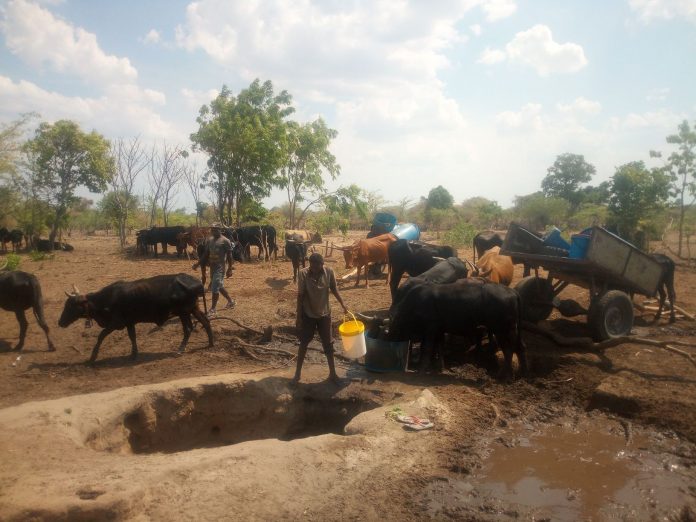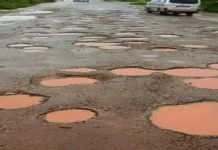Tawanda Marwizi
Extremely high temperatures, dry rivers, severe water shortages, deepening water tables and, now, rising diarrhea cases and scotch-cart accidents have become the order of the day.
Can life become more unbearable for folks in Muzarabani?
The description above would sound more like expletives, but they aptly describe the lives of villagers in the Chiwenga area of Muzarabani in Mashonaland Central province.
Villagers feel like they have been cursed, memories of rivers flowing through their area are just that – sheer memories.
Years of persistent droughts and low rainfall have made their lives unbearable.
Their environment is all about dry, scotched and thirsty to a point one even feels it just by watching the surroundings.
High temperatures, a character of the valleys of Muzarabani, has left all water sources virtually dry.
Life for both human beings and their domestic animals is a daily struggle for survival. فريق بايرن ميونخ
Located about 350km west of Harare, Chiwenga is right on the border between Zimbabwe and Mozambique, and villagers travel as far as 15km to fetch water.
Two boreholes – one at Keche and the other at Kairezi – serve more than 60 villages including Mudzimu, Kairezi, Madhiri and Chionde.
The desperate situation has forced villagers to turn to the dry river beds for the precious liquid.
Once perennial, people are not sure when the rivers, now riddled with galleys and wells, last flowed.
The wells, once shallow, continue to deepen as people chase the receding and deepening water table.
Maria Muoni, a villager from Kairezi, said the situation has forced them to drink from unsafe water sources.
“The only place that has safe water is Chiwenga Business Centre and the clinic, but it is very far from our villages. تطبيقات لربح المال في مصر
“Sometimes we send children to fetch water for us, but sometimes we go for unsafe water because there are no other options,” she said.
Children have to abandon school to fetch water.
“The children miss classes to get the water from Chiwenga and this becomes detrimental to their educational development,” David Chikweta narrated recently.
Villagers who do not have children to send to the riverbed wells known as mufuku struggle.
At schools such as Mudzimu Primary School, parents take turns to fetch water for teachers who cannot travel the long distance on week days.
“We take turns to travel to Chiwenga that is about 12 kilometers away to access safe water for the teachers for local schools.
“This is a community initiative as we try to save them from the pathetic situation,” Masimba Demba said.
To make matters worse, scotch-cart accidents have also been on the increase with children among the majority of victims.
Government efforts to assist the villagers have not been fruitful although boreholes have been cited at several places.
Boreholes as deep as 38m have been drilled with little joy.
Diarrhea cases have also been on the rise in the past two weeks.
Chiwenga Clinic has recorded a sharp increase in diarrhea cases from 25 to 34 in the past fortnight.
Masimba Kaziboni, the health centre committee chairperson in the area, describes their situation as dire. سيرجيو راموس
“There is no water in this area and despite people walking long distances to get clean and safe water and we are now recording high cases of diarrhea,” he said.
The increasing cases, he said, were a result of unsafe water sources.
“It’s sad that while efforts to have boreholes drilled are ongoing these have been unsuccessful as the water table continues to sink low,” Kaziboni said.
The area’s environmental health technician, Hwayerera Milton said the piped water in the area was strained.
“The piped water was for the school and clinic but the desperation situation has forced us to make sure villagers also benefit,” he said.
The pipe water system was installed by the Zimbabwe Red Cross Society (ZRCS) in partnership with the Finish Red Cross as part of their Disaster and Risk reduction programme in 2017.
ZRCS secretary general Maxwell Phiri said the project was part of several others which are part of their disaster and risk reduction programmes.
The programmes aim to bring clean water and sanitation to the villagers.
“We endevour to bring relief to the rural communities through the scheme while working with volunteers to provide safe water for the villagers,” he said.
In Kachingwe village, the ZRCS dug a deep well – estimated at 38m – that is now serving about 360 households although more villagers from as far as Kairezi come to fetch from the same source.
“The water problems in Muzarabani are far from ending but we will work hard to give people clean and safe water,” Phiri said.
Commissioning the piped water scheme in 2017, Presidential Affairs Minister for Mashonaland Central Monica Mavhunga acknowledged the water challenges in Muzarabani.
She said government would continue working with organisations such as the ZRCS to avert similar challenges.
The United Nations, in 2010, through Resolution 64/292, recognized the human right to water and sanitation.
It also acknowledged that clean drinking water and sanitation are essential to the realisation of all human rights.
The resolution calls on States and international organisations to provide financial resources, help capacity-building and technology transfer to help developing countries, to provide safe, clean, accessible and affordable drinking water and sanitation for all.
The UN also notes that in rural Sub-Saharan Africa millions of people share their domestic water sources with animals or rely on unprotected wells that are breeding grounds for pathogens.
The average distance that women in Africa is 6km while people lacking access to improved water in developing countries consume far less, partly because they have to carry it over long distances and water is heavy.
It further states that at any one time, close to half of all people in developing countries are suffering from health problems caused by poor water and sanitation.












